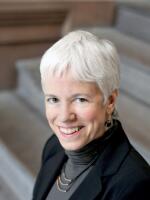A number of New York State officials charged with combating global warming attended the United Nations climate change summit this month in Scotland. They say not enough progress was made, and they hope New York can lead by example with more ambitious goals.
Doreen Harris is president of NYSERDA, which stands for the New York State Energy Research and Development Authority. Harris says while critics of the international climate change summit say it was more talk than action, it had some positive achievements.
“There certainly was value in attending,” Harris said.
Harris says she was pleased by the decisions to reduce methane emissions by 30% by 2030, as well as an agreement to end deforestation by the end of the decade.
But she says it fell short on agreements to reduce reliance on fossil fuels.
“That was an area where I personally had hoped for more progress to be made on global level,” Harris said.
Climate scientists agree that if the earth’s climate warms by more than 1.5 degrees Celsius, the results will be disastrous. The temperature increase since the beginning of the industrial era is already at 1.1 degrees Celsius.
New York’s Department of Environmental Conservation Commissioner Basil Seggos, who also attended, says the harmful effects of climate change are already being felt in New York and elsewhere. He cited incidents like the intense rainfall earlier this year that led to deadly flooding in Queens, as well as flooding in some upstate areas.
“I’d say we are in peril already,” Seggos said.
Seggos says he would have liked to see environmental justice advocates and younger people included in the talks.
But Seggos says he is optimistic about the progress that individual states, provinces and regions, including New York, are trying to achieve to reduce climate change. He says New York is among 260 “subnationals,” representing more than 1.75 billion people, that are taking stronger steps.
New York’s ambitious goals, set in 2019, include the state sourcing 70% of its electricity from renewable energy by 2030, using 100% carbon-free electricity by 2040, and reducing greenhouse gases by 85% from 1990 levels by 2050.
Seggos and Harris are the co-leaders of the newly formed Climate Action Council, a panel of more than two dozen state agency heads, environmental advocates and energy industry representatives. It is tasked with devising a road map to carry out the goals, and is working on a draft report due at the end of the year.
Harris says it will be challenging, and require some big changes to the economy.
“They’re hard,” Harris said. “They’re challenging because they are the changing the way in which we live. I would say for the better.”
Blair Horner with the New York Public Interest Research Group, a government reform organization, agrees that the state has set some admirable goals that are far ahead of most other governments. But he says officials need to move faster, and can’t wait to act until the end dates approach.
“You can’t leave it to the last minute,” Horner said. “This is not like a term paper in college that you can just pull an all-nighter and make it happen. This is one of those things where every year you have to take another bite at it to reduce greenhouse gas emissions, to enhance the use of renewable power and to improve energy efficiency.”
NYPIRG released a report earlier this year measuring the state’s progress, and found that with nine years left in its goal to have 70% of electricity come from renewable sources, the state gets just 27% of its energy from renewable sources and just 5% from wind or solar. The report also found that New York has reduced greenhouse gas emissions so far by just 13% from 1990 levels.
Harris, with NYSERDA, says New York already has 20 major renewable energy projects in the works. She says the recently enacted federal infrastructure measure, along with proposals in the Build Back Better bill, will help with funding for more clean energy projects.
Environmental Commissioner Seggos says some of the most beneficial decisions the state has made in recent years have been to say “no” to some projects, including banning hydrofracking of natural gas in 2014 and denying applications for two new gas burning plants.
In January, the Climate Action Council will begin a 12-month public comment period on its plan for carrying out the global warming reduction goals. At least six public meetings will be held, as well as other activities to get the word out.



